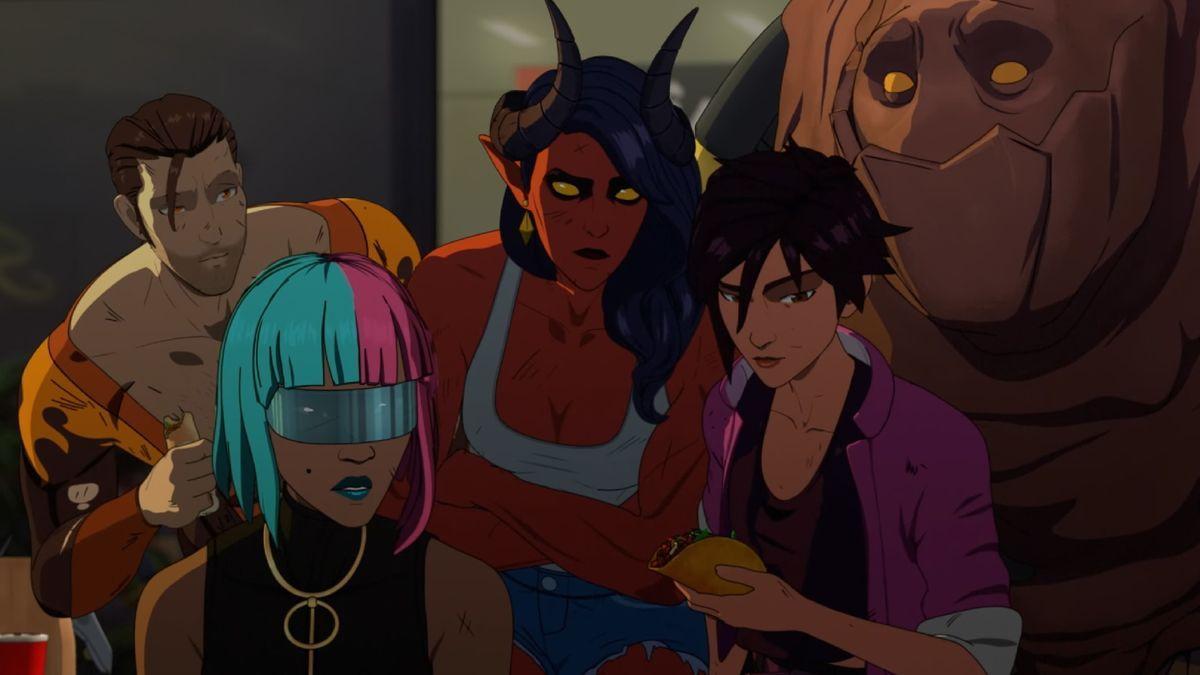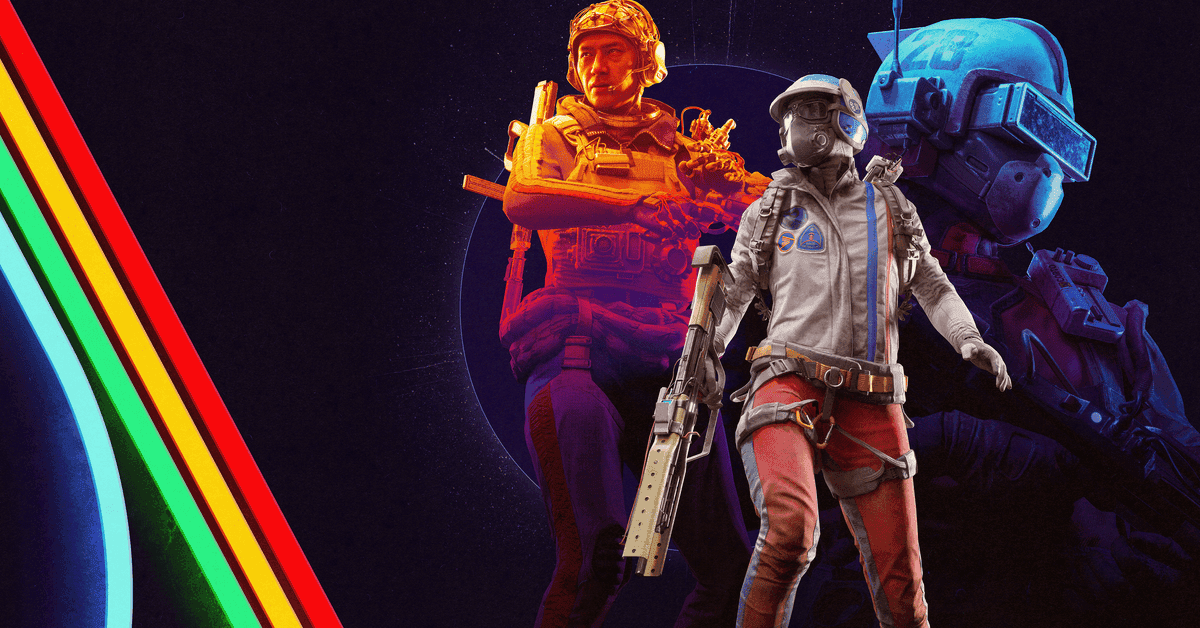Dispatch Developers Take Strong Stance Against AI Voice Acting in Gaming
2 Sources
2 Sources
[1]
"Maybe AI is a creative solution if you aren't a creative person" - Dispatch devs take a firm, refreshing stance against AI
Dispatch developer AdHoc has no interest in using AI to replace voice actors or game development. AI is still a hot topic within the gaming community, with many developers using the technology in their own releases. However, AdHoc has no intention to use AI for its own games, especially not when it comes to voice acting. AdHoc's creative director Nick Herman and executive producer Michael Choung recently sat down with Eurogamer's sister site GamesIndustry.biz to chat all things Dispatch. The studio's episodic superhero workplace comedy has been a hit since its release earlier this year, with many (myself included) praising Dispatch's voice cast for elevating the experience. The cast includes Aaron Paul of Breaking Bad fame, as well as The Last of Us and James Bond actor Jeffrey Wright as retired superhero Chase, among others. So, where does AI come into it? Well, speaking on Wright's performance as Chase earlier this month, Herman stated: "No AI is going to do what he did." "He brought something to that character that we weren't expecting," Herman continued. "I mean, his performance and Aaron's performance and our whole cast are bringing performances and elevating the material in a way that you're just not going to get [with AI]. You're not going to be surprised because it's built on something you've heard before if you go the AI route. "So, yeah, honestly, AI feels like a production solution, not a creative one. Maybe it's a creative one if you aren't creative." "Whatever we're building, it has to connect," Choung added. "It's got to be made by people. It's got to connect to people. We're looking at AI, we're monitoring the stuff that AI is doing, like everybody else. But... it seems to be having a lot of trouble trying to get to a 'good enough' spot. And 'good enough' for us is the enemy. "Also we're not getting up every morning and talking to ourselves like, 'hey, what if we did this with less people? What's the lowest number of people we can use to make this thing?' This is like not anything that we're too concerned with!" The developers added they aren't going to judge others for their own use of AI, and they can "speak for themselves" should they feel it necessary to do so. But, for AdHoc, AI, "right now, it just doesn't make a ton of sense". Earlier this year, AdHoc announced Dispatch had sold over 1m copies in just 10 days. Thanks to this success, the studio is now considering a second season (perhaps one with more sex scenes, given the "ravenous" response to the first season).
[2]
As Arc Raiders faces backlash for its AI voices, Dispatch leads call the tech "a production solution, not a creative one," saying it can only offer "something you've heard before"
He praises Dispatch's cast for "elevating the material in a way that you're just not going to get [with AI]" Dispatch's creative director Nick Herman and executive producer Michael Choung have spoken out about the use of AI voices in games. The episodic superhero adventure game uses well-known actors to voice its characters, including Jeffrey Wright from Westworld and Aaron Paul from Breaking Bad. Arc Raiders has come under fire for the use of AI voices via text-to-speech, though Embark Studios co-founder Stefan Strandberg justifies the decision saying, "there's no end goal in replacing any actors." In an interview with GI.biz, when asked for his opinion on the use of AI voices, Herman says, "AI feels like a production solution, not a creative one. Maybe it's a creative one if you aren't creative." Herman isn't just dunking on AI because it's the current trendy thing to do. He explains why he thinks using voice actors is so important. "No AI is going to do what [Jeffrey Wright] did," says Herman. "He brought something to that character that we weren't expecting." He further praises the whole cast for "elevating the material in a way that you're just not going to get [with AI]," explaining that you'll "only hear something you've heard before if you go the AI route." Choung adds that the studio is "monitoring the stuff that AI is doing", but says the technology struggles to reach "good enough," adding further that "'good enough' for us is the enemy." Choung even hits back at studios that are trying to reduce the number of people it needs to hire in order to make its games. "We're not getting up every morning and talking to ourselves like, 'hey, what if we did this with less people? What's the lowest number of people we can use to make this thing?' This is like not anything that we're too concerned with," he says. Despite this, he doesn't want to "sit here and judge" Embark for the decision it has made. "For us... [using AI voices] just doesn't make a ton of sense."
Share
Share
Copy Link
AdHoc studio's creative leads argue that AI voice technology is a "production solution, not a creative one" while defending their use of human actors like Jeffrey Wright and Aaron Paul in their hit game Dispatch.
AdHoc Takes Firm Stance Against AI Voice Technology
AdHoc studio, the developer behind the successful episodic superhero workplace comedy Dispatch, has taken a definitive position against using artificial intelligence for voice acting in their games. In recent interviews with GamesIndustry.biz, the studio's creative director Nick Herman and executive producer Michael Choung articulated their philosophy that prioritizes human creativity over technological shortcuts
1
2
.Herman's critique of AI voice technology was particularly pointed, stating that "AI feels like a production solution, not a creative one. Maybe it's a creative one if you aren't creative." This sharp assessment comes as the gaming industry grapples with increasing adoption of AI technologies across various development processes
1
.The Human Element in Performance
The developers' stance is rooted in their direct experience with acclaimed voice actors. Dispatch features a star-studded cast including Jeffrey Wright, known for his roles in Westworld and The Last of Us, and Aaron Paul from Breaking Bad. Herman emphasized Wright's irreplaceable contribution, noting that "No AI is going to do what he did. He brought something to that character that we weren't expecting" .

Source: GamesRadar
The creative director argued that human performers "elevate the material in a way that you're just not going to get [with AI]." He explained that AI-generated voices can only offer "something you've heard before," lacking the spontaneity and unexpected elements that human actors bring to their roles
2
.Industry Context and Controversy
AdHoc's position comes amid growing controversy over AI voice usage in gaming. Arc Raiders, developed by Embark Studios, recently faced significant backlash for implementing AI voices through text-to-speech technology. Embark's co-founder Stefan Strandberg defended the decision, claiming "there's no end goal in replacing any actors," though this justification has not quelled criticism from players and industry observers
2
.Choung addressed the broader industry trend toward cost-cutting measures, stating that AdHoc doesn't wake up "talking to ourselves like, 'hey, what if we did this with less people? What's the lowest number of people we can use to make this thing?'" He emphasized that this approach to minimizing human involvement "is not anything that we're too concerned with" .
Related Stories
Technical Limitations and Quality Standards
The executive producer also highlighted technical concerns with current AI voice technology. While acknowledging that the studio is "monitoring the stuff that AI is doing," Choung noted that the technology "seems to be having a lot of trouble trying to get to a 'good enough' spot." For AdHoc, he emphasized that "'good enough' for us is the enemy," indicating their commitment to higher quality standards .
Despite their strong position, the developers maintained a diplomatic stance toward other studios' choices. Choung stated they don't want to "sit here and judge" other developers like Embark for their AI implementation decisions, acknowledging that different studios can "speak for themselves" regarding their creative choices
2
.References
Summarized by
Navi
Related Stories
Arc Raiders Reignites AI Voice Controversy as Embark Studios Defends Text-to-Speech Technology
30 Oct 2025•Entertainment and Society

Baldur's Gate 3 Actor Neil Newbon Criticizes AI in Gaming: "It's Shit"
29 Jul 2025•Entertainment and Society

Gaming Industry Splits Over AI Use as Arc Raiders Success Sparks Heated Debate
11 Nov 2025•Technology

Recent Highlights
1
Pentagon threatens to cut Anthropic's $200M contract over AI safety restrictions in military ops
Policy and Regulation

2
ByteDance's Seedance 2.0 AI video generator triggers copyright infringement battle with Hollywood
Policy and Regulation

3
OpenAI closes in on $100 billion funding round with $850 billion valuation as spending plans shift
Business and Economy





